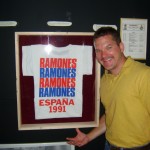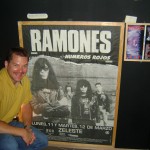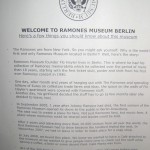 Visiting a museum dedicated to my favorite Rock-n-Roll band no doubt ranks high on my bucket list. You see, I grew-up listening to the Ramones, a NYC punk rock band who played simple rock beats really (REALLY) fast. I was probably 15 years old when I first started listening and instantly enjoyed such catchy lyrics as “Gonna get my Ph.D., I’m a teenage lobotomy.” What better inspiration for a 15 year old kid… to go off to college and earn a Ph.D. Now, thinking back about it all I wonder if my affinity for the music had more to do with adolescence than getting a Ph.D? Oh well, guess that’s a good discussion for another day. The fact is, Ramones songs were never played on the radio. My friends and I learned about their music from sharing record albums and making mixed cassette tapes. A few of us liked the sound of the Ramones, although it was difficult to know much about the band because I grew-up in the days before the internet and my parent’s home didn’t have cable or MTV access.
Visiting a museum dedicated to my favorite Rock-n-Roll band no doubt ranks high on my bucket list. You see, I grew-up listening to the Ramones, a NYC punk rock band who played simple rock beats really (REALLY) fast. I was probably 15 years old when I first started listening and instantly enjoyed such catchy lyrics as “Gonna get my Ph.D., I’m a teenage lobotomy.” What better inspiration for a 15 year old kid… to go off to college and earn a Ph.D. Now, thinking back about it all I wonder if my affinity for the music had more to do with adolescence than getting a Ph.D? Oh well, guess that’s a good discussion for another day. The fact is, Ramones songs were never played on the radio. My friends and I learned about their music from sharing record albums and making mixed cassette tapes. A few of us liked the sound of the Ramones, although it was difficult to know much about the band because I grew-up in the days before the internet and my parent’s home didn’t have cable or MTV access.
As an adult I learned the band was more popular in South American countries such as Chile, Argentina and Brazil than they ever were the US. In South America, the band played to legions of loyal fans in sold-out stadiums only to return home to the US to play mostly small venues and local clubs.
One of my research interests is Organization and Administration of Sport Programs, a graduate course I teach at MU. It’s always curious to me why certain sports are more popular than other sports in certain geographic locations? Why is it that some teams are successful and win whereas others are not successful and lose? For instance, soccer is the most popular sport in the world but continues to rank behind football in the US. What is it then about a culture that accounts for a sport’s popularity, or a team’s win-loss record? Similarly, I often wonder why some bands like the Ramones were never very popular is US but giants overseas? Could there be a correlation between a successful sports team and a successful rock band?
The Ramones did gain some recognition in the US with their induction into the Rock-n-Roll Hall of Fame in 2002 having played their last show together in 1996. Luckily, I was able to see the band perform twice in-concert, both times in Pittsburgh. Not knowing what to expect when I arrived for the first show, I remember being surprised to see other fans listening to Ramones songs in their cars and singing aloud to the words.
As a sort of twist of fate, several of us from my school who had made the drive to Pittsburgh to see the show were standing in-line waiting to enter. Ron, a classmate of mine was standing in-line just in front of me. Entering the basement ballroom where the show was being held, Ron handed his ticket to the ticket-taker who proceeded to tear his ticket in-half giving him one half, and interestingly, me the other half in order to speed-up the process of getting people into the venue. As Ron and I walked down the stairs, I asked him if he would mind giving me his half of the ticket. Ron was not much of a Ramones fan, but more into the class activities and friends who were attending the show so he agreed and I placed both ticket stubs in my pocket. Later upon returning home after the concert, I taped the ticket together and have kept it ever since as a souvenir.
During that first show I developed some minor hearing loss from standing directly in-front of the huge speakers located within a few feet from the stage. For three straight days I remember nothing but buzzing and ringing in my ears. There are several anecdotal accounts that the Ramones were perhaps one of the loudest bands to play music during this era.
In sports, synergy is sometimes known as good chemistry–the factor that sometimes either makes or breaks a team. Several leadership authors identify this concept of synergy as being a key ingredient for group success. As a band, the Ramones never had much chemistry off-stage, however, on-stage was a different story as demonstrated by their long career. Politically, the band members resonated to different ends of the spectrum. The lead singer Joey Ramone was involved in several liberal initiatives over his lifetime whereas the lead guitarist Johnny Ramone was active in conservative endeavors. The main drummer Marky was kicked-out of the band for being an alcoholic, and the bass player Dee Dee once departed the group to start a rap band that failed miserably. None of band members were related, although many people think the Ramones were brothers given their similar appearance and use of the same stage last name. Neither Joey or Johnny liked one another very much and rarely spoke to the other although they continued to travel, make music, and play shows together for 22 years.
Several books have been written about the band which make for interesting reading and good study about perseverance, group dynamics, and career success.









